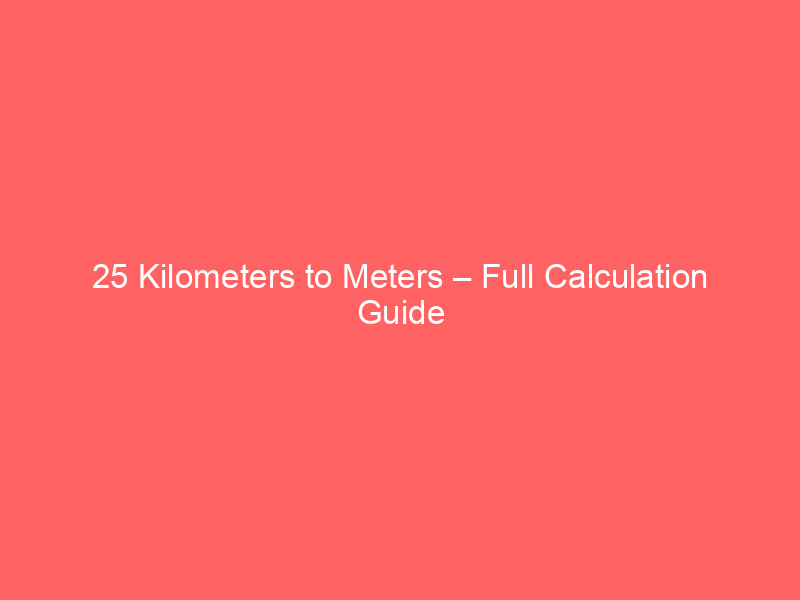Result of 25 kilometers to meters is 25000 meters.
Since 1 kilometer equals 1000 meters, converting 25 kilometers means multiplying 25 by 1000, giving us 25000 meters. This straightforward calculation helps us easily convert larger distances into smaller, more precise units for measurements or conversions.
Conversion from kilometers to meters
The conversion works because kilometers and meters are both units of length in the metric system, with 1 kilometer being exactly 1000 meters. To convert kilometers to meters, you simply multiply the number of kilometers by 1000. For example, 25 km times 1000 equals 25000 meters.
Conversion Tool
Result in meters:
Conversion Formula
The formula to convert kilometers into meters is simple: multiply the amount of kilometers by 1000. This is because each kilometer contains 1000 meters. So, if you have a distance in kilometers, multiplying it by 1000 gives the length in meters. For example, 10 km times 1000 equals 10,000 meters.
Conversion Example
- Convert 10 km to meters:
- Step 1: Take the number in kilometers, which is 10.
- Step 2: Multiply 10 by 1000 (since 1 km equals 1000 m).
- Step 3: 10 * 1000 = 10000 meters.
- Convert 5.5 km to meters:
- Step 1: Take 5.5 km.
- Step 2: Multiply 5.5 by 1000.
- Step 3: 5.5 * 1000 = 5500 meters.
- Convert 0.75 km to meters:
- Step 1: Take 0.75 km.
- Step 2: Multiply 0.75 by 1000.
- Step 3: 0.75 * 1000 = 750 meters.
Conversion Chart
| Kilometers | Meters |
|---|---|
| 0.0 | 0 meters |
| 5.0 | 5000 meters |
| 10.0 | 10000 meters |
| 15.0 | 15000 meters |
| 20.0 | 20000 meters |
| 25.0 | 25000 meters |
| 30.0 | 30000 meters |
| 35.0 | 35000 meters |
| 40.0 | 40000 meters |
| 45.0 | 45000 meters |
| 50.0 | 50000 meters |
This chart helps to quickly see how different distances in kilometers convert into meters. To find the meters for any km value, just look across the row and read the corresponding meters.
Related Conversion Questions
- How many meters are in 25 kilometers?
- What is the length in meters if I travel 25 km?
- Can you convert 25 kilometers to meters for me?
- How do I convert 25 km into meters manually?
- What is 25 km expressed in meters?
- How many meters is 25 km in total?
- Convert 25 km to meters, please?
Conversion Definitions
Kilometers are a metric unit of length equal to 1000 meters, used to measure longer distances like roads or journeys. They are part of the metric system, which is based on powers of ten, making conversions straightforward within the system.
Meters are the base unit of length in the metric system, representing a standard measure of distance. They are used universally for measuring lengths from small objects to large distances, and are fundamental in science, engineering, and daily measurements.
Conversion FAQs
How accurate is the conversion from kilometers to meters?
The conversion from kilometers to meters is exact because it relies on a fixed relationship where 1 km equals exactly 1000 meters. There is no approximation involved, so the result is precise as long as the input is accurate.
Can I convert fractional kilometers to meters using this method?
Yes, converting fractional kilometers, like 2.75 km, involves multiplying the fractional number by 1000. For example, 2.75 km times 1000 equals 2750 meters. This method remains consistent regardless of whether the kilometers are whole or fractional.
What happens if I input a negative number in the conversion tool?
If you enter a negative value, the conversion will multiply it by 1000, resulting in a negative meter value. While distances are usually positive, the calculation itself works mathematically, but negative distances might not have practical meaning in most contexts.
Is this conversion applicable for real-world distance measurements?
Yes, converting kilometers to meters is used in real-world contexts like mapping, navigation, and engineering. It helps to express longer distances more precisely, especially when small differences in length are important.
Table of Contents



